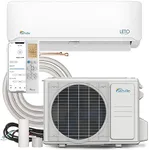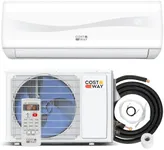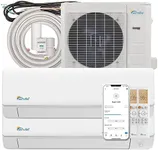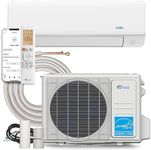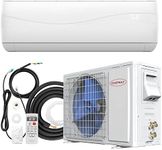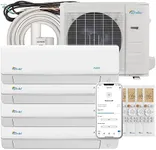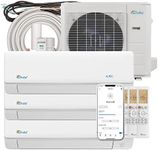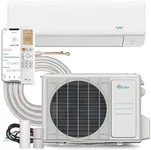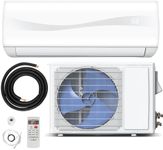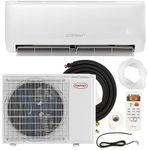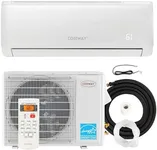Buying Guide for the Best Mini Split Air Conditioners
Choosing a mini-split air conditioner can make a big difference in your comfort at home, especially if you want efficient cooling and heating without the need for ductwork. The right unit will depend on your room size, climate, and how you plan to use it. Understanding the main features and specifications will help you find a system that fits your needs and keeps your space comfortable year-round.Cooling Capacity (BTU)Cooling capacity, measured in BTUs (British Thermal Units), tells you how much heat the unit can remove from a room per hour. This is important because a unit that's too small won't cool your space effectively, while one that's too large will cycle on and off too often, wasting energy. Small rooms (like bedrooms) usually need 9,000-12,000 BTU, medium rooms (living rooms) may need 12,000-18,000 BTU, and large open spaces might require 18,000 BTU or more. To pick the right size, consider your room's square footage, ceiling height, insulation, and how much sunlight it gets.
Energy Efficiency (SEER Rating)The SEER (Seasonal Energy Efficiency Ratio) rating measures how efficiently the mini-split uses electricity to cool your space. A higher SEER means lower energy bills and less environmental impact. SEER ratings typically range from 13 to over 20. If you plan to use your mini-split often or live in a hot climate, a higher SEER is better. For occasional use or mild climates, a lower SEER may be sufficient. Always check the SEER rating to balance efficiency with your usage needs.
Heating Capability (Heat Pump Function)Many mini-splits can also heat your space using a heat pump. This is useful if you want year-round comfort from one system. The heating capacity is also measured in BTUs and should match your cooling needs. If you live in a region with cold winters, look for a model that can provide efficient heating even at low outdoor temperatures. If you only need cooling, you can choose a cooling-only model.
Number of ZonesMini-splits can be single-zone (one indoor unit for one room) or multi-zone (multiple indoor units connected to one outdoor unit). This is important if you want to control the temperature in different rooms independently. For a single room, a single-zone system is enough. For whole-home or multi-room comfort, consider a multi-zone system, but remember that each zone adds complexity and cost.
Noise LevelNoise level, measured in decibels (dB), tells you how loud the unit will be when running. Lower numbers mean quieter operation, which is important for bedrooms or quiet spaces. Most mini-splits are quieter than window units, but some are nearly silent. If you’re sensitive to noise, look for models with a low indoor noise rating, usually between 19-30 dB for the quietest operation.
Installation FlexibilityMini-splits offer different options for where and how the indoor unit is mounted—wall, ceiling, or floor. This matters if you have limited wall space or specific design needs. Wall-mounted units are most common, but ceiling cassettes or floor units may fit your room better. Think about your room layout and where the air will flow best when choosing the installation type.
Smart Features and ControlsSome mini-splits come with smart features like Wi-Fi connectivity, remote control, and programmable timers. These make it easier to control your system from your phone or set schedules for energy savings. If you like convenience or want to integrate your air conditioner with smart home systems, look for these features. If you prefer simple controls, a basic remote may be enough.
